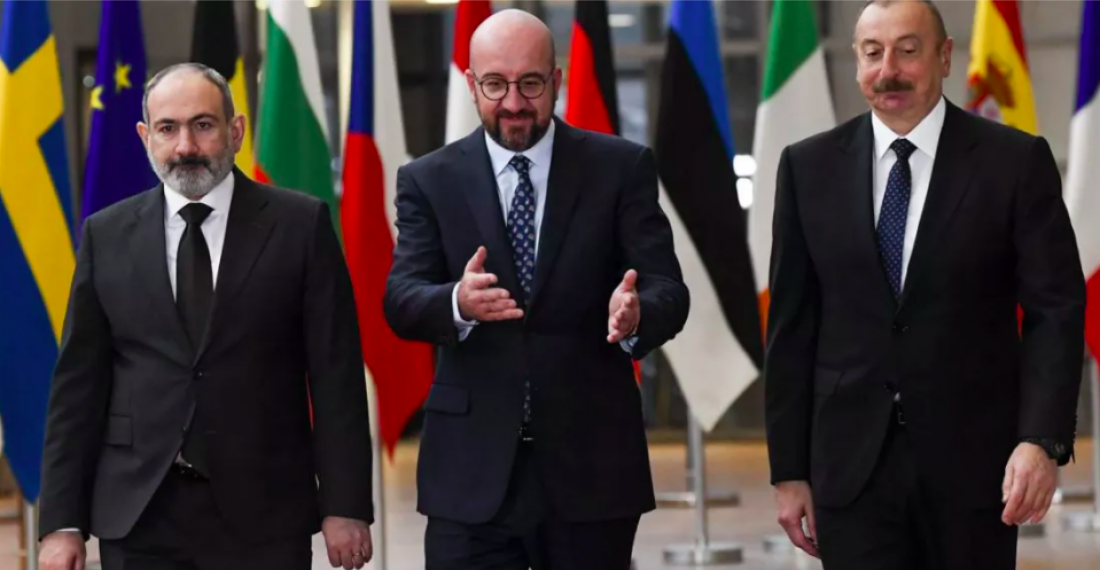This week's summit of Azerbaijani president Ilham Aliyev and Armenian prime minister Nikol Pashinyan, mediated by European Council president Charles Michel, marks a growing mediating role for the EU, something which is welcomed by both Baku and Yerevan, writes Vasif Husseynov in this op-ed. There are now two separate tracks in the peace process, one led by Brussels, the other by Moscow. So far they are complimentary, and should remain so, he argues.
The April 6 summit of the leaders of Armenia and Azerbaijan with the mediation of European Council president Charles Michel was a historic event in the cooperation between the sides. Unlike their December 14 trilateral summit which also took place in this format, but on the sidelines of another major event [the summit of the Eastern Partnership Programme], attending the latest summit was the sole purpose of the visit of Azerbaijani President Ilham Aliyev and Armenian Prime Minister Nikol Pashinyan to Brussels. It marks a growing mediating role of the European Union (EU) in the Armenia-Azerbaijan peace process – something which is welcome by both Baku and Yerevan.
Another major difference between the two EU-mediated summits is in the content of the negotiations and the outcomes reached. The December 14 summit fell short of bringing about tangible novelties to the peace process and, instead, reaffirmed the agreements that had already been reached between Baku and Yerevan through the mediation of Moscow in their trilateral meetings of January 11 and November 26 in 2021. Hence, after this summit, there was an impression that the EU mediation will be instrumental more in the settlement of “soft issues” like those of humanitarian and economic nature – a view that was also underpinned by the fact that unlike the two Russia-mediated trilateral summits, the December 14 summit did not produce any programmatic documents with a roadmap to follow.
The latest Brussels summit of the Armenian and Azerbaijani leaders demonstrated that the EU is keen to boost its profile in the Eastern neighborhood – a policy shift that has been likely affected also by the Russia-West tensions in the region. Not only did the sides hold negotiations about the major issues between them but also, they announced some plans for their future activities – although, as last time, no document was produced as a result of their talks. Another noteworthy development was the initiative to start bilateral negotiations between Baku and Yerevan on the issues related to the delimitation of the Armenia-Azerbaijan interstate border and the preparation of a peace treaty.
Armenia and Azerbaijan had agreed about the establishment of a commission about the border delimitation and demarcation process with the participation of Russia in Sochi on 26 November 2021. According to the agreement, they were supposed to establish this commission by the end of 2021. However, this did not happen due to unknown reasons. The Brussels summit of April 6 reinvigorated this issue and announced that the sides will convene a Joint Border Commission by the end of April. “That commission will have a double mandate, the first one relates to the main delimitation works, and the second one is to ensure security and stability along the border”, according to Armenian Prime Minister.
This process will also include the exchange of territories close to the interstate border. “You know that there are Armenian territories that are under the control of Azerbaijan, and there are Azerbaijani territories that are under the control of Armenia. These issues must be solved as a result of negotiations”, according to the Armenian Prime Minister. This will be part of larger process of preparation of a peace treaty which the sides started in Brussels on April 6. According to their agreement, the foreign ministers of the two countries were tasked to start the preparations for the future peace treaty and initiate talks and contacts in this direction.
Nevertheless, there are still issues which are out of the agenda of the EU-mediated talks and remain in the exclusive sphere of Russia’s engagement. This is primarily about the situation in the part of the Karabakh region of Azerbaijan that is temporarily under the peacekeeping mission of the Russian Federation. The post-summit statements by President Charles Michel and Prime Minister Nikol Pashinyan did not touch on the incidents in this region in March, and Azerbaijan’s demands for the withdrawal of the Armenian troops in this area in accordance with the trilateral statement of November 10, 2020 that ended the Second Karabakh War.
The next day (April 7) in a government meeting Pashinyan said this issue was discussed in Brussels but the sides failed to reach a common understanding. Pashinyan said that, due to this lack of consensus, he preferred not to dwell on this question, which he found more appropriate to discuss with the participation of the Russian side which is present on the ground. This indicates that, as opposed to such claims by some observers, Russia remains a critical player in the Armenia-Azerbaijan peace process, although it will now need to consider the outcomes of the EU-mediated negotiations in its agenda.
This brings about two separate tracks in the peace process, with one mediated by the EU and the other by Russia. Although the two tracks are so far complementary, there is hardly any coordination between Brussels and Moscow. Hopefully, the two tracks would not clash – since this would dramatically jeopardize the peace process and cause serious instability in the South Caucasus.



